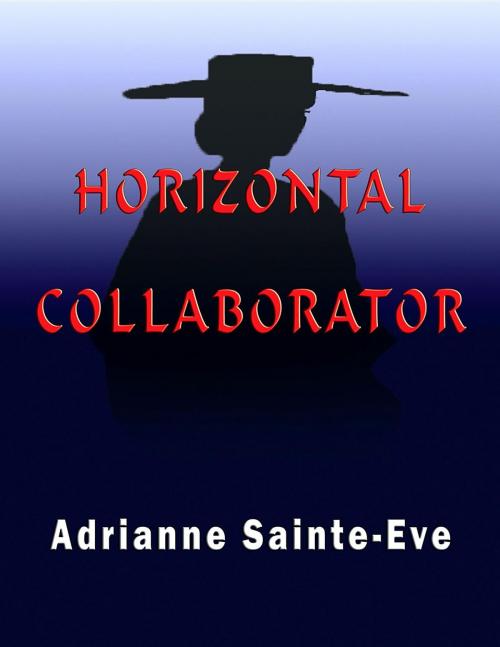| Author: | Adrianne Sainte-Eve | ISBN: | 9781590957400 |
| Publisher: | TotalRecall Publications, Inc. | Publication: | March 23, 2016 |
| Imprint: | TotalRecall Publications, Inc. | Language: | English |
| Author: | Adrianne Sainte-Eve |
| ISBN: | 9781590957400 |
| Publisher: | TotalRecall Publications, Inc. |
| Publication: | March 23, 2016 |
| Imprint: | TotalRecall Publications, Inc. |
| Language: | English |
Horizontal Collaborator takes place in Europe, from the turn of the twentieth century through World War 1. We are introduced to the eccentric lifestyle of the Hungarian nobility, which still has its roots in the feudal system, and is sharply contrasted to the childhood of Gabrielle Violette Clary, an illegitimate peasant born in the countryside of Lorraine in France.
Violette becomes a streetwise Parisienne, reveling in the unconventional café life of the period. She scratches out a living as a barmaid in Montmartre, amid surroundings that attract artists and bohemians as well as a wide variety of other characters, some intelligent, worldly people, and some who are merely bizarre. Along the way she has a youthful adventure with a handsome Hussar officer of the Austro-Hungarian Empire.
Through her dubious connections, she is presented with an opportunity to work for the French Chief of the Fifth Bureau as a double agent during the war. Despite the misgivings of the Entente, the Chief dispatches her to Spain with instructions to do what she can to infiltrate the German intelligence network, which is known to be headquartered there. After a brief training course in “spy school,” Violette boldly embarks on her ambitious undertaking armed only with her street brashness and extreme naiveté.
She subsequently becomes the mistress of the chief of German Naval Intelligence, Baron Leo von Beringer. Her assurance is severely tested as she wonders how far she can go in her deception of an extremely high-ranking German officer. Though she tries to maintain a professional distance, she is alternately attracted to and repulsed by Leo, who has many admirable traits, as well as some vile qualities. We consider whether Violette is falling under Leo’s charismatic spell, and actually which side she is really on, or if she is merely acting out of her own mercenary instincts. We wonder how long a German career officer will allow himself to be fooled by a naive young Frenchwoman, no matter how cunning and elusive.
A theme of interconnectedness unfolds between the characters, though they are widely scattered throughout France and Spain and the great empires of Prussia and Austria-Hungary. We follow the various threads of their lives as they converge. As she navigates through sharply contrasting class and culture differences, we see their bizarre similarities as well as their differences. They are rife with contradictions, nothing is simply black or white, everyone who lives is shackled by his own endless misperceptions and delusions, and lives are connected in mysterious and seemingly coincidental ways.
She reconnects with Zoltán, the handsome Hussar, and another disastrous chain of events begins. The war drags on, she senses that Leo’s infatuation is declining, and she tries to plan her escape, but another character from Violette’s past turns up and complicates everything. She realizes her position is much more dangerous than she had thought, and that she can expect very little help from the French government. At the conclusion the reader is left wanting more, and the nature of the ending and the characters lend themselves to a possible continuance.
Horizontal Collaborator takes place in Europe, from the turn of the twentieth century through World War 1. We are introduced to the eccentric lifestyle of the Hungarian nobility, which still has its roots in the feudal system, and is sharply contrasted to the childhood of Gabrielle Violette Clary, an illegitimate peasant born in the countryside of Lorraine in France.
Violette becomes a streetwise Parisienne, reveling in the unconventional café life of the period. She scratches out a living as a barmaid in Montmartre, amid surroundings that attract artists and bohemians as well as a wide variety of other characters, some intelligent, worldly people, and some who are merely bizarre. Along the way she has a youthful adventure with a handsome Hussar officer of the Austro-Hungarian Empire.
Through her dubious connections, she is presented with an opportunity to work for the French Chief of the Fifth Bureau as a double agent during the war. Despite the misgivings of the Entente, the Chief dispatches her to Spain with instructions to do what she can to infiltrate the German intelligence network, which is known to be headquartered there. After a brief training course in “spy school,” Violette boldly embarks on her ambitious undertaking armed only with her street brashness and extreme naiveté.
She subsequently becomes the mistress of the chief of German Naval Intelligence, Baron Leo von Beringer. Her assurance is severely tested as she wonders how far she can go in her deception of an extremely high-ranking German officer. Though she tries to maintain a professional distance, she is alternately attracted to and repulsed by Leo, who has many admirable traits, as well as some vile qualities. We consider whether Violette is falling under Leo’s charismatic spell, and actually which side she is really on, or if she is merely acting out of her own mercenary instincts. We wonder how long a German career officer will allow himself to be fooled by a naive young Frenchwoman, no matter how cunning and elusive.
A theme of interconnectedness unfolds between the characters, though they are widely scattered throughout France and Spain and the great empires of Prussia and Austria-Hungary. We follow the various threads of their lives as they converge. As she navigates through sharply contrasting class and culture differences, we see their bizarre similarities as well as their differences. They are rife with contradictions, nothing is simply black or white, everyone who lives is shackled by his own endless misperceptions and delusions, and lives are connected in mysterious and seemingly coincidental ways.
She reconnects with Zoltán, the handsome Hussar, and another disastrous chain of events begins. The war drags on, she senses that Leo’s infatuation is declining, and she tries to plan her escape, but another character from Violette’s past turns up and complicates everything. She realizes her position is much more dangerous than she had thought, and that she can expect very little help from the French government. At the conclusion the reader is left wanting more, and the nature of the ending and the characters lend themselves to a possible continuance.















